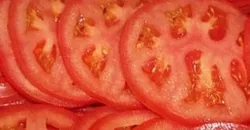 In fresh-cut tomatoes, the quality deterioration is associated with translucency, firmness loss and membrane degradation that occur also in fresh intact tomato after long-term cold storage as consequences of chilling injuries.
In fresh-cut tomatoes, the quality deterioration is associated with translucency, firmness loss and membrane degradation that occur also in fresh intact tomato after long-term cold storage as consequences of chilling injuries.Italian and Spanish scientists have investigated the effect at ripening stage and temperature on membrane degradation, electrolyte leakage and lipid peroxidation (assessed by thiobarbituric acid reactive substances, TARS) on 10-mm-thick tomato slices.
For the study, round-fruit tomatoes cv. Jama were minimally processed testing three ripening stages: mature green (MG), pink (PK), and full ripe (FR). Both fresh-cut and intact tomatoes were stored in polyethylene containers at 4 and 15°C for 7 days.
Results showed that tomatoes are susceptible to minimal processing at all three ripening stages tested. Anyway, the MG stage of ripeness is not important for fresh-cut produce because it is not suitable for fresh-cut preparation, while FR fruits are closer to the senescent stage of maturity. In slices prepared from pink tomatoes and stored at 4°C, no significant variations of electrolyte leakage and lipid peroxidation were found; adversely, in slices stored at 15°C, the values of both parameters increased, especially after 1 day of storage.
As regards the enzymatic activity measured in both fresh-cut and intact tomatoes stored at 4°C, results showed that phospholipase C had higher activity than phospholipase D.
The scientists have concluded that membrane integrity, as an indicator of fruit senescence, in fresh-cut tomatoes is mainly influenced by the ripening stage at processing time, storage and duration of storage. Processing operations accelerate tissue degradation by activating the phospholipase enzymes during storage.
Finally, the parameters investigated in this study could be used in breeding programmes to select a tomato cultivar suitable to the fresh-cut chain, that means a cultivar with low electrolyte leakage and TARS values and lower phospholipase activities.
Source: Natalini A., Vanesa M.-D., Ferrante A., Pardossi A., "Effect of temperature and ripening stages on membrane integrity of fresh-cut tomatoes", 2014, Acta Physiol. Plant., Vol.36, pagg. 191-198. Info: http://link.springer.com/article/10.1007%2Fs11738-013-1399-2#page-1
